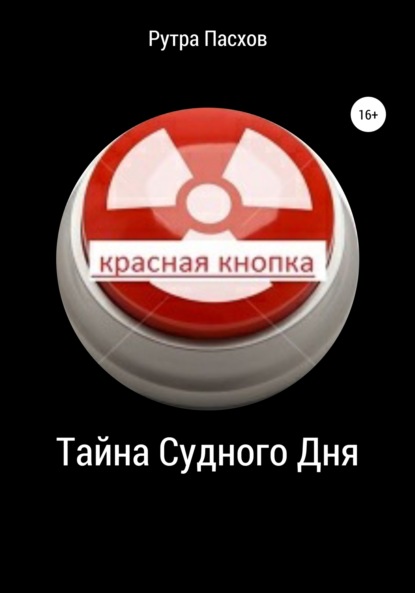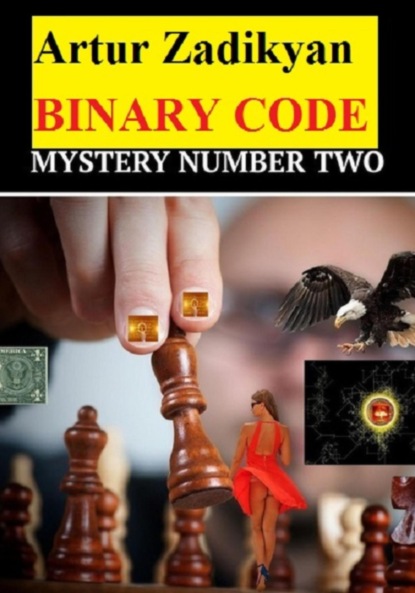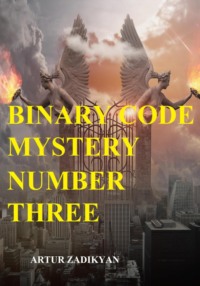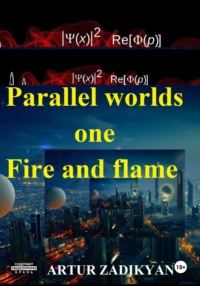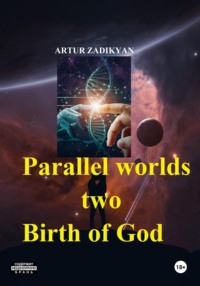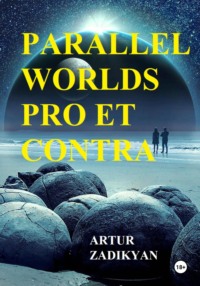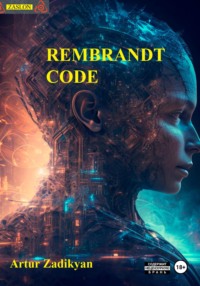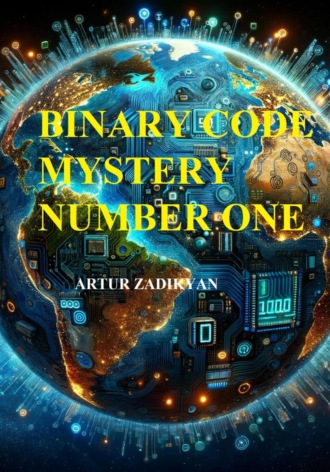
Полная версия
Binary code: Mystery number one
A number of programs were prepared. Some of them had to be watched and listened to for further recommendations. The first was a program on one of the popular channels to which a world renowned scientist had been invited. On this one, Rutra gave them a "pass".
The host began the program, and Rutra put aside his current affairs to listen more closely. The host welcomed the audience and the guest.
– Good afternoon, Alexei Norayrovich. Good afternoon, dear viewers. For those who think that global catastrophe is a fantasy of paranoiacs, I suggest that you read the lecture "Global Climate: Yesterday, Today, Tomorrow", and then read the course "Historical Geology". This I mean that even without the fruits of mankind's activity, I mean negative for mankind and for the planet as a whole, there are enough options and threats to the extinction of civilization. When the atomic bomb was created in the USA, people still knew little about nuclear energy. There were different assumptions – for example, that a nuclear explosion would provoke a split and destruction of the Earth with a 30% probability. And that didn't stop the politicians. The temptation to own a new superweapon was too great. So they can't stop themselves. But if the majority of humanity speaks out against this thing, they will be stopped by a higher power. Therefore, I repeat: if you value your life and the lives of your children, contact presidents and other authorities who can and must cancel the possible upcoming suicide of our civilization.
And our guest is Alexei Sisakyan, Russian scientist in the field of elementary particle physics, theoretical and mathematical physics, academician of the Russian Academy of Sciences in the Department of Physical Sciences, Doctor of Physical and Mathematical Sciences, Director of the Joint Institute for Nuclear Research.
– Alexei Norairovich, if we take the Large Hadron Collider in Geneva as an example of a fruit of human civilization, what could be its danger? After all, there are all sorts of assumptions, predictions and fears that the collider could be the cause of a global catastrophe.
– Indeed, concerns have existed and do exist. Whatever fears exist, science will not stand still. The Large Hadron Collider faces two fundamental tasks: the search for the so-called Higgs bosons – elementary particles responsible for the formation of mass – and the discovery of a supersymmetric world, the existence of which is still only a hypothesis.
Our Earth is, in fact, a graveyard of species: biologists estimate that about one billion species have evolved on Earth since the origin of life, and now there are only two million. Is not the mind also some hypertrophied, like body mass in dinosaurs, a function leading to inevitable death? But then the mind is just an unsuccessful invention of nature, a dead-end branch. What is the specific cause of doom? Atomic war, ecological disaster? Not likely. It is clear that with all the possible diversity of "local" conditions, the demise of different civilizations must occur for one universal reason. What is it? The universal reason for the death of mind in the Universe can be connected with the loss of its main function – the function of cognition. The forces preventing the development of the mind must be universal, independent of specific conditions. Accidents in this case can reach apocalyptic proportions. Technology is full of terrible traps, and a fatal end awaits those who enter it. Intelligent beings are able to recognize the danger, but when it is too late. Having got rid of the religious beliefs that entice the fulfillment of immediate desires, civilizations try to slow down their acceleration, but it is no longer possible.
– So should we be afraid or not? Is a global catastrophe possible?
– There has to be a scientific approach. We have to look at what the experiments show. If we know something's killing us, it doesn't make us more alive! That's it.
The presenter announced:
– Let me remind you once again that our guest was Academician Alexey Sisakyan, a Russian scientist in the field of elementary particle physics. This is the end of our program, please write to us at our e-mail address on the Internet.
***
The topic was promoted at the highest level. Recommendations and "requests" went to Russia's central channels. World agencies followed suit.
One of them reported: "The Russian Federation, represented by Arsen Kiselev, a Russian TV presenter of the program "Vesti Nedeli", said live on air about a possible nuclear strike on the territory of the United States of America by the Russian system "Perimeter". Arsen Kiselyov said on TV that Russia is the only country in the world capable of turning the United States into radioactive ash. We are talking about the so-called Russian system for controlling a massive retaliatory nuclear strike against the US called Perimeter. This is a system of a massive automatic nuclear strike by the entire nuclear arsenal of the Russian Federation against the United States of America."
After two months of daily broadcasting of information, the Perimeter system, the countries' nuclear potential, its power and possible consequences were known even in those parts of the world where television and radio were still a novelty. The primary goal was practically achieved.
When the topic was sufficiently promoted in the media, the "system" warned of the threat of nuclear war. The effect was achieved, the only thing left to do was to figure out "where the wind was blowing from. The clue was in the following: generals of the Russian Federation and the United States made a statement: "The danger of nuclear war is higher now than ever before".
It was like thunder, and not just for the public.
This statement was replicated in the media, and the following part stood out in particular: "In practice, this means that the decision to launch a retaliatory strike must be made on the basis of information received from early warning systems – from satellites and ground radars. The flight time of a strategic missile is 15 to 30 minutes. Thus, a decision on a retaliatory launch must be made in a matter of minutes. This is very dangerous, as any failure in the early warning system of a missile strike, any provocation can become a signal for the immediate start of a nuclear war. With the emergence of cyber threats, this danger increases manifold. This is why the White House and the Kremlin need to forget about confrontation and bilaterally abandon the principles of retaliatory strikes based on information from warning systems and the training of strategic nuclear forces to launch such strikes.
With this turn of events, Zero had a lot of work to do. It was necessary to send out dispatches to find out whether it was a personal initiative or a "recommendation initiative".
Chapter 11. Flight into the unknown

One morning Rutra was brewing his coffee out of habit. Chief Zhidkov came into his office and asked:
– Don't you think we're in a Groundhog Day situation?
– Why not?" said Ruthra, smiling slightly.
– Rutra Tigrovic, it's time to move on to a new phase.
– What, are we speaking at the USND? – Rutra asked jokingly, but realized that he was referring to something more important than the U.S. National Defense University, since Yuri Vasilyevich rarely addressed those younger than him by name and patronymic, much less by rank.
– No, something else. I must introduce you to one more (perhaps the last) secret.
– What is it?
– This is the station. Are you ready to visit it?
– You know, Yuri Vasilyevich, that I'm always ready.
– You need to spend at least a week on it.
– What are we going to do there? – Ruthra stared at Zhidkov questioningly.
– To be enlightened," Vasilyevich replied simply and briefly.
– Curious," Ruthra replied calmly. – What about my business trip? You told me to prepare my staff and family for a business trip of at least a week.
– And what, you got it ready?
– Oh, yeah.
– And how did the family react?
– My wife is already here, and I told the kids I'd come with presents. They are well aware that "Daddy can do it", as they say.
– Great, then let's go.
They descended to an even deeper level, the elevator doors opened at a narrow gauge, shabby station, boarded the car, and "rolled. Ruthra didn't see anything remarkable (except for the gray branches), though he was surprised at the depth of the level and the sheer number of branching routes whose names were indicated by numbers. At last the wagon came to a stop. To go on, in the other direction, it was necessary to make a change. Vasilievich was silent, and Ruthra tried not to ask unnecessary questions, waiting for the end of the journey. Again the stations began to pass before his eyes.
After a while they reached the gates of the most classified part of the tunnel. The gate opened, though Vasilievich had given no command. Rutra's curiosity was growing, peaking as they headed for the Capsule station.
– Now you're about to learn a secret that those who have been allowed into Metro 2 don't even know about.
– What's the mystery?
– There is a Metro-3. This is where you and I came down," said the colonel.
– Is there a Metro Four?" – Ruthra asked, trying not to give his question a tone of sarcasm.
– No, there's no fourth. Did you realize we went down to the third?
– Got it, just didn't think it was a subway. Although it's not clear what was where we were having a smoke break.
– It's not really a subway, there are such dead ends that even I don't know everything in so many years.
– What's a capsule station?
– You're about to find out.
They got off at this station, which was similar to the one where Vasilievich had told them about the Perimeter problem. No one was there, there was a sliding iron door on the opposite wall. Zhidkov approached it, looked into the reader's scanner, there was a click, and the door slid open. There was a huge pipe. To get into it, he had to push back another hatch, which Vasilievich did. Rutra saw a kind of capsule inside, a specially equipped place for one person.
– Sit down, or rather – lie down, you'll try it out, – said the chief.
– I hope no trickery is intended?
– How can our work be without a catch?
– Is it safe? – Ruthra asked in a firm voice.
– Trust me, absolutely. The road to heaven is always safe. This is a new installation for emergency and high-speed travel between stations.
Ruthra looked around the rig; there didn't seem to be anything dangerous in it. He climbed in, and Vasilievich slammed first the hatch of the capsule itself and then the main hatch. Rutra got a little worried, looked questioningly through the glass windows of both hatches at Vasilievich. He smiled in his pleasant way. Inside the capsule was a soft bed-chair that automatically "enveloped" him so that he was almost in a spacesuit. There were no controls of any kind. Rutra looked at the Colonel again, no sound was heard, Vasilievich was indicating something with his hands – either "no" or "don't do it". In a split second several metamorphoses occurred to Rutra – waves of anxiety, outrage, indignation, concern and uncertainty came over him all at once. He realized the meaning of Vasilievich's gesture – "goodbye." Rutra's body shook with the jerk of the "capsule," which raced, accelerating more and more, down the tube. Where was this strange machine going? Rutra did not lose his composure. Logic told him he was not going to death.
Part Two: Binary Code-2. Polygon of civilization
We often look for parallel worlds without noticing the real world around us. We want to solve a conspiracy theory without knowing the theory itself. Are there organizations running the world? From this book you'll learn about the one and only mystery. Rutra, by fate or by someone's design, has fallen into it. What awaits him? Who is his friend and who is his enemy: human or artificial intelligence? Who will come back out – him or his double? A fascinating journey into a super-secret, super-technological world hidden in the bowels of the earth awaits you.
The most powerful influence on us is a secret that is carefully hidden from us.
Chapter 1: The testing ground of civilization

The capsule was accelerating at breakneck speed, and it was dark. Ruthra was nervous, shaking violently. Suddenly there was light, the capsule was passing through the station. Ruthra noticed that this station was very similar to the one where he had boarded the tube; he saw the sign "#22" on the wall and remembered that at the beginning of the journey it had said "#21". The capsule swept through the station; pitch blackness came again. Ruthra calmed down a bit and looked around. The capsule wasn't so cramped. A holographic display lit up in front of his face, and the words "Speak" flashed on it, not very brightly. After a little thought, he asked:
– What to say and to whom?
– Good afternoon," a female voice replied.
– Who am I talking to?
– I am the central reference computer, my call sign is Knight.
Ruthra thought it was a prank at first, but the situation was too serious for jokes. The pod sped past another station, which was exactly the same as the previous two. Ruthra oriented himself: the Knight call sign indicated that the stations had official names as well. It was customary in intelligence and military circles to use secret designations for facilities, towns, villages, military units, etc.; to contact a station, you had to give the operator a secret call sign.
Where is the capsule going? Judging by what Vasilievich said, he figured that the capsule would return to where he sat in it.
– Where is the capsule going? – Ruthra asked.
– The capsule is not coming, the capsule is going," the voice replied.
– Don't be so smart, tell me where the pod is going. – Ruthra said irritably.
– The final destination is the Polygon facility. I am a computer, I answer according to the program, don't get angry.
Ruthra took a deep exhale, calmed down, determined to make contact:
– I understand you're an operator?
Although Zero had employed a similar machine capable of supporting logical dialog, he had never had a conversation with it that way.
The computer did not respond. Then Ruthra decided to emphasize the more important question:
– What's "Polygon"? We have to go back.
– Program set," the voice replied.
– Where is this located? – Ruthra was outraged, though he tried to remain calm.
– The Polygon Center is an advanced level training facility.
– What level? I've had enough of my own.
– I'm not authorized to answer that.
– Where is it located?
– The Polygon facility is located at paragraph 88.
– 88? – Ruthra asked in surprise and annoyance.
– 88," repeated a voice from the speakers.
The capsule was traveling through a very long station, and it was not like the others: high ceiling, huge tubes partially embedded in the wall running in a semicircle along the walls. Ruthra realized that they were not tubes: incredibly, they were marked with ballistic missile markings. On exiting the station, the number 36 was painted on the wall. "When will it be 88?" – he thought. After running through several options in his mind, Rutra decided to check the "interlocutor".
– Tell me all about Center Zero," he said.
– The answer requires an eight-digit tolerance code.
– All right, tell me what you're authorized to tell me.
– About what, exactly?
– Tell me about the Polygon point," Ruthra suggested.
– The Polygon Center is used to enhance individuals," the computer replied briefly.
– That's it?
– That's it for you. For more information – you must give the eight-digit authorization code.
– Where am I supposed to get it?
– You should know it if you have a security clearance.
– I guess I have clearance, but no code," Ruthra said, more to himself than to her. – Well, why do I need you as my interlocutor?
– I can answer unclassified questions and I also monitor your well-being.
– And how am I feeling? – Ruthra asked with some sarcasm.
– Your parameters are normal," the computer mind replied calmly.
– Unclassified questions – what are those for you?
– They're not for me.
It was no use getting angry, you had to ask in a way "she" understood.
– What questions are unclassified? – Ruthra asked, hoping for a precise answer.
This time the computer got it 'right', though it didn't help Ruthra. "She" said:
– I can answer any publicly available questions from open databases and some about ongoing processes.
– Can you get on the internet?
– Yeah, that's absolutely right.
– Can you put on some music?
– I can.
– How much more time is needed to reach station number 88?
– Another 32 minutes and 19 seconds," the computer replied with extreme precision.
– Is there any destination information you can give me?
– Not without an access code.
Ruthra considered it useless to dialog further.
– Turn on the Discover Trance radio station," he asked.
– I'm on it.
A dynamic melody began to play in the capsule. Ruthra decided to gather his thoughts, to analyze what was happening.
***
Soon enough, the capsule stopped. The door opened. A man in a strange jumpsuit, white gloves, and a face mask (like a doctor's) opened the capsule's hatch.
– Come out," he said with absolutely no emotion.
There was something familiar and yet mysterious in his gaze. Ruthra stepped out, looked around, and asked:
– Where am I?" cried Ruthra.
– Follow me. Don't shout," the man in overalls said calmly. – You are nobody here, only three people know that you are here.
– Who are these three men?
– The one who sent, the one who met, and the one we are going to.
– What is your rank? – Ruthra asked in a commanding voice.
– My name is Ruthra, come along," he said. – You will soon get over it.
– How!?
Ruthra looked closely at the stranger and realized that it was an exact replica of him. He looked anxiously into the eyes of the man in all white and asked quietly:
– What's going on?
There was no response. The doppelganger turned around, heading for the door on the opposite side. Ruthra saw that everything around him was white, like an operating room.
– What the hell is this all about, I demand an answer!
– Come on, I told you, it'll pass soon.
– What will pass? Who are you? Where am I? I demand communication with Center Zero! – Rutra shouted.
The doppelganger walked ahead, and Ruthra followed him, or rather, he caught up with him and tried to make him answer questions. They reached a door that blended in with the wall, like everything else here. Ruthra-2 stood in front of the scanner, a red beam appeared, and the door opened. Behind it was a large vestibule (like a freight elevator).
– Come in," the doppelganger said.
Ruthra entered and waited for the man in white to enter as well, but it never happened.
– Take your clothes off.
– Why? – Ruthra asked.
– Take your clothes off!
Rutra wanted to get out, but at that moment a spark flashed at eye level and an electric shock ran through his body. Pain shot through his body and Rutra fell down, he was slightly concussed.
– What's going on here, who are you, who's in charge? – Ruthra struggled to speak, stood up and prepared to attack his copy.
– Take off your clothes," the doppelganger repeated again.
Ruthra assessed the situation, but before he could do anything, he was shocked again. He fell, this time the shock was stronger. Ruthra struggled to speak:
– Where am I going?
– You're a reasonable man, obey orders.
– What, whose? – Ruthra asked.
– Mine," said the doppelganger. – I'm Colonel Rutra here, and now it's up to you to decide whether you or I get out of here to the center.
Ruthra began to speculate in his mind: is this a prank, a test, just plain crazy…
– Why colonel? I'm a lieutenant colonel.
– You will if you pass the exam.
Ruthra remembered that Vasilievich had promised to initiate some grand secret after he passed the exam. Besides, the chief had said that Rutra would get clearance to all departments.
– Take off your clothes," the same order followed again.
Ruthra decided to see what would happen. It was reassuring that he hadn't been killed yet. So he could hope that his life was not in danger. He stripped down to his underwear.
– Completely," the same order followed again.
A hatch in the corner opened. Ruthra had taken off his underwear after all.
– Throw your clothes over there.
Ruthra wanted to object, but he saw the look in his copy's eyes. He had to obediently follow the command, pushing the things into the hole.
– Take off the belt.
Ruthra always wore a leather belt with an electronic key to the safe where the codebooks and the dialing device for entering secret codes were kept. It was never allowed to be removed, not even in the bathroom.
– I can't take it off, the belt can only be torn or cut.
– Tear it up," the doppelganger said.
Ruthra tore the belt with difficulty and threw it into the hatch, secretly hoping that the alarm that the Zero Center should sound after this manipulation would save him. The hatch closed automatically. The doppelganger instantly slammed the door shut. Ruthra was left alone. Something clicked in the "vestibule," and several small openings opened at the bottom, top, right, and left. A stream of liquid came from everywhere, so strong that it hurt. Ruthra tried to hide his face, turning in different directions because standing in one position was painful. He waited impatiently for it to stop. The shower watered Rutra for about five minutes, the smell from the water was unpleasant, resembling a mixture of disinfectants. When the shower ended, warm air under great pressure flowed through the holes. The surface of the body became completely dry.
A recess opened in the wall to the right. It contained the same overalls as the double, socks, underwear, and shoes. Ruthra realized it was all meant for him. He dressed, then the door opened.
– Let's go," the Rutra doppelganger said in a calm, monotone voice.
– Explain what's going on!
– You'll be told everything soon enough," the doppelganger replied.
They walked to the end of the room. The doppelganger rested his forehead against the wall and froze for a few seconds. Ruthra realized it was a method of identification, and part of the wall moved away, revealing a long corridor. Everything was white – floor, ceiling, walls, furniture.
– Keep up," the doppelganger said and walked quickly forward.
Ruthra could barely keep up with him, it was a veritable white-washed maze.
– Where are we going? Why can't we go straight ahead?
– You haven't been to 51 yet.
– Where?" asked Ruthra.
– You still have a long way to go, wait for it.
– Wait for whom? – Ruthra asked, trying not to show his anger.
So they reached the room, the entrance to which the doppelganger had discovered by retinal scanning. There was nothing here (except a few oddly shaped chairs).
– To adapt, you must attend an introductory lecture," the doppelganger announced nonchalantly.
– Some other nonsense? – Ruthra asked.
There was no reply, of course. The doppelganger remained silent. Ruthra waited, curious and indignant. A minute or so passed.
– Have a seat, listen.
Ruthra sat down in the chair, and the doppelganger moved to the wall. Speech came from somewhere in the ceiling, apparently there were invisible speakers built in. A woman's voice announced:
– Information preparation. Part one. Medical professionals have learned how to beam knowledge directly into the brain. Leading scientists have made a new innovative discovery. They have created a special computer that allows you to pump information into the human brain. The unique discovery belongs to the researchers of the center HRL Laboratories, which is located in the city of Malibu, California. The authors of the project believe that in the future, when this technology can be improved, people will be able to use it to accelerate the acquisition of necessary skills, for example, to quickly learn foreign languages or learning to drive. In addition, each person will be able to create a clone: it will be possible to "print" a person using a 3D printer in just 2 hours and 47 minutes. Special lasers have been developed that can print 100 cells in a few seconds. Nanoengineering experts are studying the possibility of cloning a human heart on a 3D printer. According to them, if the technology is developed, the vital organ can be printed incredibly quickly – in 30 seconds. But that's not all – scientists have created a drug in case of nuclear war. An international group of scientists has developed a drug to combat the effects of radiation on the human body. The drug was created on the basis of the medical department of the University of Texas in the USA.


